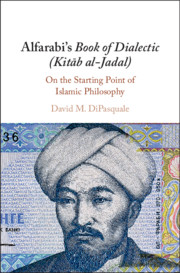Book contents
- Alfarabi’s Book of Dialectic (Kitāb al-Jadal)
- Alfarabi’s Book of Dialectic (Kitāb al-Jadal)
- Copyright page
- Dedication
- Epigraph
- Contents
- Preface
- Acknowledgments
- Introduction
- 1 Alfarabi’s Kitāb al-Jadal: A Complete English Translation
- 2 Dialectic and Political Science
- 3 Dialectic and the Principles of All Science
- 4 Dialectic and the Method of Natural and Divine Science
- 5 Dialectic and Education
- 6 Conclusion: Alfarabi and the Taxonomy of the Medieval Arabic Organon
- English–Arabic
- Arabic–English
- References
- Index
4 - Dialectic and the Method of Natural and Divine Science
Published online by Cambridge University Press: 11 October 2019
- Alfarabi’s Book of Dialectic (Kitāb al-Jadal)
- Alfarabi’s Book of Dialectic (Kitāb al-Jadal)
- Copyright page
- Dedication
- Epigraph
- Contents
- Preface
- Acknowledgments
- Introduction
- 1 Alfarabi’s Kitāb al-Jadal: A Complete English Translation
- 2 Dialectic and Political Science
- 3 Dialectic and the Principles of All Science
- 4 Dialectic and the Method of Natural and Divine Science
- 5 Dialectic and Education
- 6 Conclusion: Alfarabi and the Taxonomy of the Medieval Arabic Organon
- English–Arabic
- Arabic–English
- References
- Index
Summary
In this chapter, I examine how the art of dialectic might be used to resolve (or at least bring to light) the ‘perplexities’ that surround Aristotle’s presentation of the natural world. Contemporary scholars have noticed the strange fact that Aristotle’s procedure in the Physics resembles not so much the strict progression of demonstrative proof as outlined in the Posterior Analytics but, instead, the dialectical method described in the Topics. This accords with Maimonides’ claim in the Guide of the Perplexed that Aristotle was aware of the fact that the level of argumentation in Physics and De Caelo is less than demonstrative. Now, if it is the case, as Maimonides stresses in the Guide, that the ‘true perplexity’ concerns the incompatibility of Aristotelian physics and Ptolemaic astronomy, and if Aristotelian physics has been presented in dialectical form, how might dialectic be used to resolve this most profound perplexity?
Keywords
- Type
- Chapter
- Information
- Alfarabi's Book of Dialectic (Kitab al-Jadal)On the Starting Point of Islamic Philosophy, pp. 194 - 238Publisher: Cambridge University PressPrint publication year: 2019

